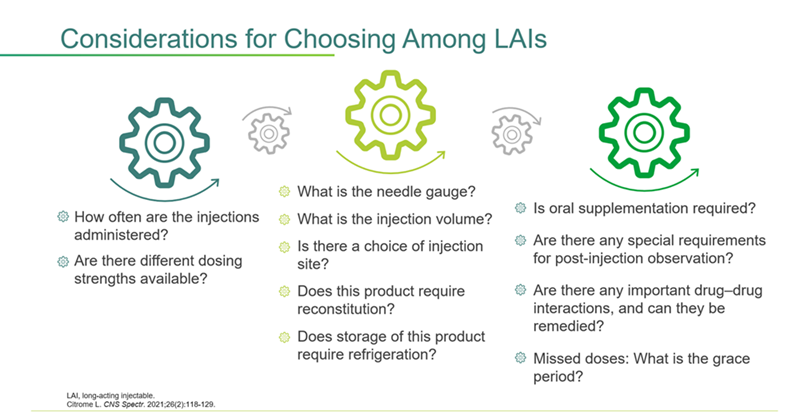Clinical dilemmas, schizophrenia treatment and the potential role of LAIs

For people with schizophrenia, clinical decisions are made at various stages during their patient journey, including the emergency department, inpatient, and outpatient settings. Assessing the unique clinical aspects of each situation and engaging with the patient appropriately is important to achieving optimal outcomes.
At the American Psychiatric Association Annual Meeting in 2022, Dr. John Kane (Professor of Psychiatry at the Zucker School of Medicine at Hofstra/Northwell, New York) discussed the development of SCOPE—a new educational tool for clinicians working in various care settings.
What is SCOPE?
Providers face unique patient care challenges, and educational initiatives targeting the most common issues they face could be useful in building knowledge and adding clarity to the role long-acting injectables (LAIs) may play in schizophrenia treatment.1,2 With this is mind, the Schizophrenia Clinical Outcome Scenarios & Patient-Provider Engagement (SCOPE) tool is currently in development. This is a new, free resource that will provide educational materials for stakeholders seeing people with schizophrenia in various patient settings. Specifically, it will provide a set of queries or questions to consider when patients attend the emergency department, and a framework to inform clinical dilemmas and scenarios observed in inpatient care and outpatient clinics, and when LAIs may be considered in these settings.
Listen to Dr. Kane explain the rationale for SCOPE:
Inpatient case study
One scenario included in SCOPE is that of a 35-year-old inpatient with an existing schizophrenia diagnosis who was receiving an oral antipsychotic (AP), but had relapsed. In such a situation, many factors, such as dosing, adherence and drug–drug interactions, could play a role in the exacerbation of psychotic illness.3 While it is difficult to accurately measure adherence in schizophrenia,3 LAIs are associated with lower risks of both hospitalization and relapse than oral APs.4
In this scenario, questions to better understand the patient's history, diagnosis, medications, and comorbidities, as well as to assess any danger caused by the patient to themselves or others and their ability to care for themselves, may be considered. Answering these questions may require assessment of the patient’s social structure and questioning both the patient and their family. In this situation, given the fact the patient has been treated previously with an oral AP, but relapsed, it could be relevant to consider measuring plasma AP concentrations, in addition to routine blood tests. It is also important to rule out other underlying causes of psychosis, acknowledge the possibility of non-adherence, and assess additional sources for further information. When all these factors are considered together, the appropriateness of using an LAI could also be discussed.
Listen to Dr. Kane share questions to consider about this inpatient in the emergency department:
Listen to Dr. Kane discuss strategies to manage the patient in this scenario:
Outpatient case study
An outpatient scenario also included in SCOPE is that of a 25-year-old individual living with a schizophrenia diagnosis and comorbid substance use disorder, currently being treated with an oral AP. Comorbidities are associated with increased symptom severity, worsened disease trajectory, and high rates of non-adherence in schizophrenia.5 Studies have shown that those with substance use disorders are more likely to discontinue treatment,6 but using an LAI compared with an oral AP increases time to discontinuation.6
When reviewing treatment decisions for this patient, the following factors could be considered:
- The patient’s current mental status and their use of self-medication to address this
- The patient’s use of self-medication to address adverse events
- Any changes to the patient’s social support network or environment
- Sources of stress
LAIs could be prescribed in this case to ensure continuity of foundational medication treatment, and to help mitigate psychotogenic effects of misused substances.
Listen to Dr. Kane discuss the benefits of LAIs for those who are likely to discontinue medication:
Considerations for choosing among LAIs
Considerations for LAI initiations at an individual level include pragmatic factors, such as those outlined in the image below:7

Dr. Kane emphasized that, despite the overwhelming level of evidence to support the use of LAIs, myths around their use persist. In his opinion, people with schizophrenia should typically receive their medication via an LAI formulation. It is hoped that, by using illustrative patient scenarios, SCOPE will provide the educational support clinicians need to recognize the role and clinical value of LAIs in more settings. You can listen to Dr. Kane share this vision by viewing the presentations at APA 2022 here
To download Dr. Kane’s presentation slides, visit: https://uscnsb.tevapharm.com/scope-engage/
References
- Goldstone LW. Unmet medical needs and other challenges in the treatment of patients with schizophrenia. Am J Manag Care 2020;26:S48–54.
- Correll CU, Citrome L, Hadadd PM, et al. The use of long-acting injectable antipsychotics in schizophrenia: evaluating the evidence. J Clin Psychiatry 2016;77:3.
- Lopez LV, Shaikh A, Merson J, et al. Accuracy of clinician assessments of medication status in the emergency setting: a comparison of clinician assessment of antipsychotic usage and plasma level determination. J Clin Psychopharmacol 2017;37:310–4.
- Kishimoto T, Hagi K, Kurokawa S, et al. Long-acting injectable versus oral antipsychotics for the maintenance treatment of schizophrenia: a systematic review and comparative meta-analysis of randomised, cohort, and pre–post studies. Lancet Psychiatry 2021;8:387–404.
- Coles AS, Knezevic D, George TP, et al. Long-acting injectable antipsychotic treatment in schizophrenia and co-occurring substance use disorders: a systematic review. Front Psychiatry 2021;12:808002.
- Rubio JM, Taipale H, Tanskanen A, et al. Long-term continuity of antipsychotic treatment for schizophrenia: a nationwide study. Schizophrenia Bull 2021;47:1611–20.
- Citrome L. Long-acting injectable antipsychotics: what, when, and how. CNS Spectr 2021;26:118–29.
Dr. Kane's full APA presentation: NPS-US-NP-01073
NPS-US-NP-01131









